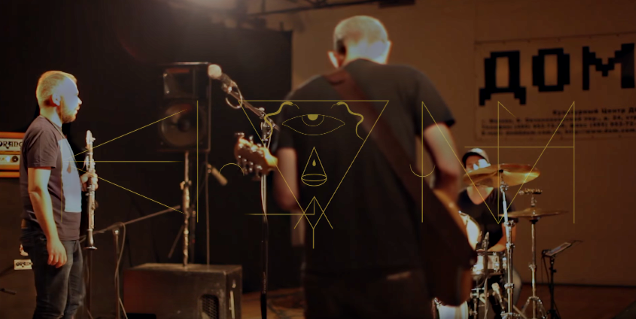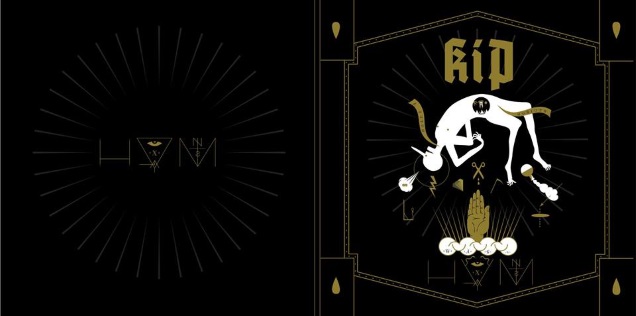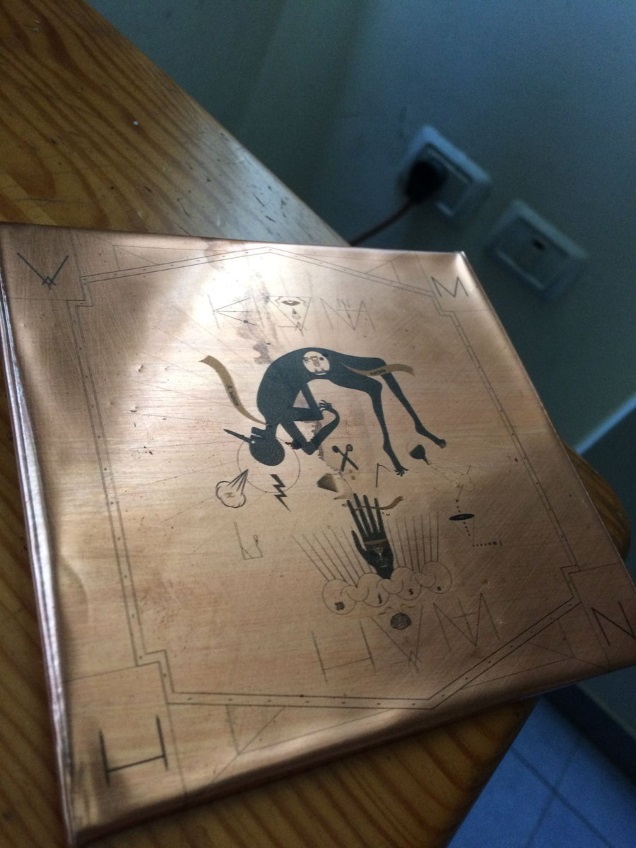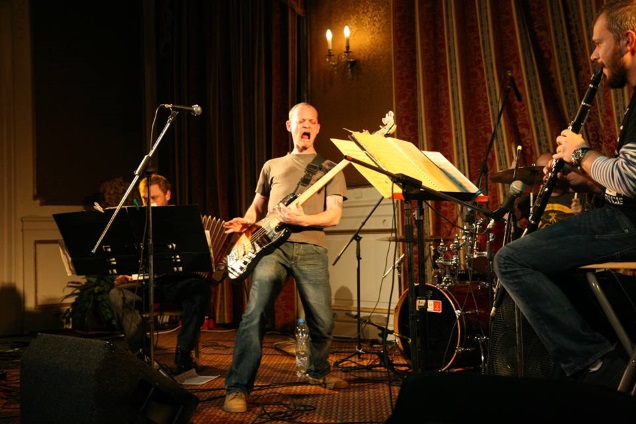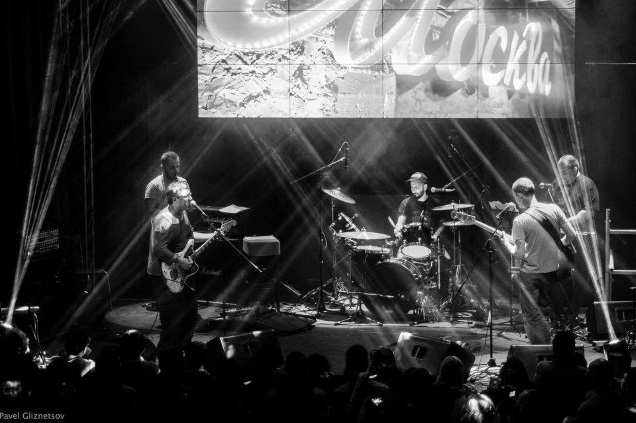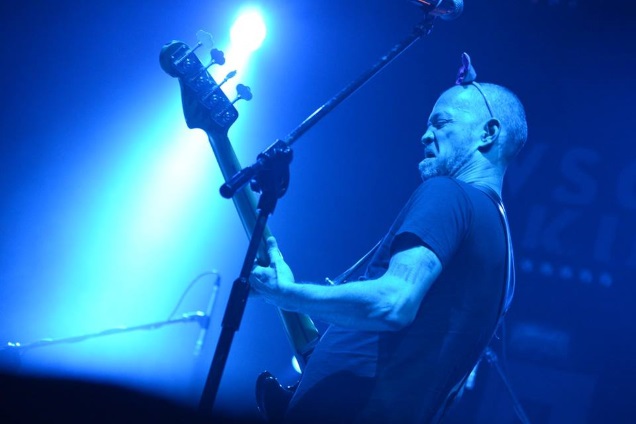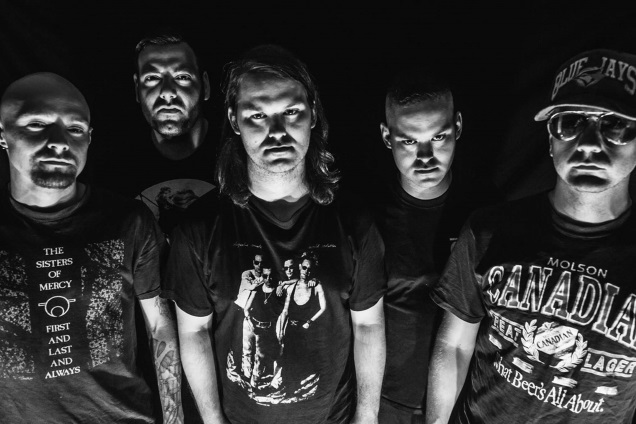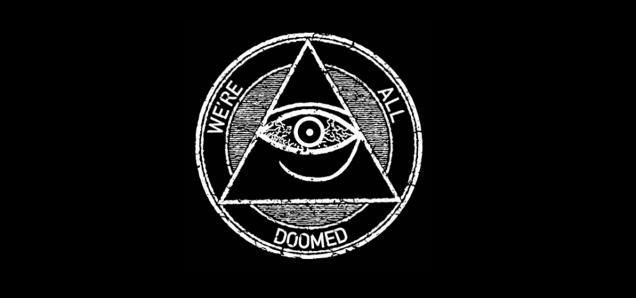Though not as conceptually absorbing as many post rock acts, Israel based trio KIP is a no less challenging effort that sounds deceitfully uncomfortable, but it’s really serves as yet another fine example of their fascinating art. Their latest 2-track, 45-minute offering is a mind-blowing maelstrom of corroded noise, gloomy strokes and irregular rock action. It vibrates with nervous pulse that drew me to their project and led us to arrange an insightful interview. Read below.
KIP (Kruzenshtern I Parohod) was founded in 2002 by Igor Krutogolov, an Israeli composer, musician and producer, following his meeting with Ruslan Gross (formerly the base player of cult hardcore band «Rabies Caste») and drummer Guy Shechter. With their new album the band changed the name to “KIP” as the new material is represents a huge stylistcal change compared to their previous material released on 6 albums and 4 collaborated records that included collaborations with artists like Eugene Robinson from OXBOW, French band VIALKA.
KIP is: Igor Krutogolov – bass, saw, vocals, Ruslan Gross – clarinet, Guy Shechter – drums.
Out there on the edge it’s cold and dark; wherever you look there is only darkness. Take one step and you might fall into a fathomless abyss, you might just land on your feet surrounded by the unexpected – music that compels you to dance, and sound that inspires endless visions. This is the geography of KIP
The music is an intricate, multilayered voyage into inner space, at times it felt almost liturgical in its meditative quality, liturgical head-banging music that makes bodies move on the dance floor. I could feel the music rattling my brain in its bone cage, at one point the cymbal’s steady intonation felt like sledgehammer meditation, and the mournful clarinet felt like a dirge for a dying world intent on self-destruction as I watched the dancing bodies swaying as if joined in prayer.
Hey guys! Thanks for taking some time with us and congratulations on the your new project. KIP is a one hell of an intriguing creature and I’m really stoked to have the opportuninty to dig in your creative minds. Tell me a bit about yourselves, your musical backgrounds and how you formed this outlet?
Thank you! Thanks for responding to our letter – it means a lot to us.
Truth be told – I don’t like dwelling in the past. It’s like being asked to play an old composition, but it gives you a heartburn. also I don’t think that KIP is our new project. It so happened, that I am the one who writes the music in KIP, and I always wanted to look in different directions and the guys as well. What we played previously, is completely different from what we play now. I’ve always been interested not in what we play, but in how music is born. Every time you begin from scratch, reach a certain point and then return to starting point. I always want to go back to the beginning of history. I’ll try to explain in brief, how it all began. I met Ruslan (Ruslan Gross – clarinet) in early 2000s . He then played in the infamous band (RABIES CASTE), on bass. Someone, I don’t really remember who, then told me that Ruslan also plays a good clarinet. Instantly I wanted to meet him, because back then I was really in to John Zorn, specifically his label “Tzadik” and also was doing my own projects as well as collaborations with various musicians. I remember inviting Ruslan to my home, there I played him a what has later became a composition from our first album ” the craft of primitive klezmer”. That evening we decided that we need a drummer. Ruslan suggested that I meet Guy (Guy Schechter – drums) . After meeting Guy, I realized that Ruslan and Guy are exactly the people that I want to work with. I wasn’t wrong! After recording our first album, I met promoter and organizer of the Israeli label “Auris Media” – Victor Levin. It was he that released our first album. Victor had done a lot for us as a collective and for me personally, I am grateful to him.
After the release , labels were stuck on us, such as Klezmer, Jazzcore, progressive, RIO and so on.
Musical direction. What are “we” with out it? I assume, that musical directions or genres, were invented so it would be comfortable placing records on shelf’s in music stores or musical minds.
But let’s see, before musical recording, there were no directions or genres .lets go back to ” Tzadik”, then, it was our musical direction., However, anything new and rapidly growing, is doomed to fail. After the release of our first album, I realized that I don’t want to play the ” musical direction” game, and it’s far more interesting to start my day by putting on “Take the heat off me” by BONEY M and ending it with “Anal baroque” by MERZBOW. And, yeah, as far as I know, other members of the band, also enjoy different types of music.
I hope that my answer was informative useful and somewhat short. Obviously, there much to be told about the history of the band and how it all began, but it seems to me that no one is really interested in that. It’s better to talk about music , not about people, Even better is just listening to it.
How is this type of experimental performance popular in Israel?
This kind of experimental performance is not popular anywhere, not in any country of the world. The whole point is in percentage. The US , for example, numbers 325 million people and there, a concert of this kind can go for 200 people. Israel, on the other hand, numbers 8 million, how many do you think would go for an experimental performance like that? That’s right – 2 and a half people. The half is the one that both wants and doesn’t want to be at the concert. These are the doubtful ones. Doubtful not in sense of – doubt leads to new knowledge, but in a sense of – should I go grab a beer or stay till the rest of the show?
For example, yesterday I was at a concert by an Israeli band “HYNOM” that in my opinion are remarkable. There were 10 people in the crowd and that’s really sad. But on the other hand, no one owes nothing to nobody. But in general, Israel is a great country, it has its pros and cons, like any other. But let’s not get sad.
Tell me more about the Tel Aviv’s underground music scene. How has it evolved over the years?
Oh my…The Tel Aviv scene. Awful, funny, sad and provincial in some sense.
If remembering the 90s , then in that period, the metal scene was toping. There was a huge amount of bands that played death metal. Nearly every month we had bands arriving from abroad , giving concerts. Obviously there’s the other side of the coin, such as pop music, but then I wasn’t familiar with it, also now I’m not interested in the Israeli pop scene as well.
I remember that at some point, everything started disappearing, gradually. The legendary club “Rosen” that hosted bands like CARCASS, NAPALM DEATH, ENTOMBED, KREATOR and many other, was shut down. Frankly, in the 2000s, when KIP was formed, we were instantly perceived as outsiders. First of all, no one played that kind of music in Israel before and second of all, we initially embraced the path of instrumental music. A song with out lyrics – usually repels rather than attracts. It’s like reading a book without pictures to a child. A man needs a semantic load , otherwise he gets bored.
I think I’m off topic.
So , 2005 brought the net to every home, or almost every , and that was enough to completely change our perception and sense of reality. A great number of bands emerged, some of them exist till this day.
Today, it got to idiocy. One goes by a club, stops, looks at the posters and thinks to himself – I used to play guitar (that’s when he was 18, and he’s 45 now), why don’t I form a band? And he forms one. It exists for about six month and breaks up , another one forms instead and so on and so on. Offtopic again, sorry.
So, anyway, I think that at some point , this tendency will illuminate it self. Roughly speaking – we need to wait till the patient dies, and it seems to me that that’s what’s happening right now. New, interesting bands emerge, and not in Tel Aviv, but in Jerusalem per say. ‘’HYNOM’’ are from Jerusalem btw.
Both as progressive thinking musicians and a band, how have YOU evolved?
It’s a little difficult to answer this question, because progression is a sequence of actions and it’s impossible to track it or keep trace of it. Today you’re at one place, tomorrow at another. obviously, I can try and sort of map my actions, but I’m not really interested in that. Sometimes I hear an old composition of mine and think to my self – that’s terrible! So trivial. After all ,what I do now is much more progressive and interesting.
But, in fact, when in if five years from now I look back at my present stuff, who’s to say I won’t feel the same.
Possibly, we play better now. We are more patient and understanding with one another and in my opinion – that’s a huge progress.
There are a multitude of sounds and influences in your tracks. Do you think this kind of hard-to-label approach can generate interest in particular, perhaps more demanding spheres of music like jazz?
Actually, I that in that this exact form, is what repels the listeners. Initially, a man is drawn to simple, understandable forms. What can’t be classified – frightens. No one wants to live in a crooked, unproportional house. Never the less, everyone enjoys looking at that house from their comfy , standard boxes.
Which have four walls, a floor and a ceiling.
Let’s try and sort it out. For example – African tribal music. What do we hear? Or if to be more precise – what do we feel? The rhythm, of course! Rhythm is the first, main core. Sound and harmony are always secondary. Rhythm – a simple form, which makes you move, regardless to your desires. For example styles such as techno or trance emerged thanks to the African tribal music. To be honest, I wouldn’t place jazz in the same comparison. Jazz is free music, as an opposite to our music which is fully engineered. For example – John Cage was of course an engineer , not a composer, in my opinion.
I think ,classical music is much more suitable in this case. This form requires some preparation and knowledge, obviously. If earlier, this kind of knowledge and preparation were to be found in every home, then presently, one has to really want to Ecquire them by him self.
So that obviously repels the listener.
In the past, going to our shows was like going to the zoo, for the listeners. Like watching a weird animal, seeing it once. Just once! They saw it, watched it, V marked it in their heads, like ” we know what that is” and it’s enough to them.
Apart from the obvious post metal and post rock archetypes, do you draw from your local tradition? Can you elaborate a little about on that?
Of course, I love what is called post metal now. Bands like ISIS, NEUROSIS…But I don’t think it’s post metal or metal what so ever. I would call it alternative, although I don’t like that word.
Obviously, our music contains a heavy sound, distortion, a certain form that somewhat reminds of post metal. But for me, it’s just an instrument. I would like to achieve that sort on monumentality that presents in classical music. That orchestral feeling, when you drown in an ocean and in the end of the peace you get thrown to shore. I adore classical music, and I work with that form. In his second symphony, Shostakovich used a clockwork toot, and we use loud sound and distortion, in order to achieve the desired result. I think that our music contains classical, but in a more simple form. There’s nothing local or traditional in our music and never had been. After all we’re immigrants. Ruslan and I, were born in the USSR. Guy is local, he was born here, in Israel. And then he was born at a time when traditional values already began their fade. Tradition is when you live where you were born, even better living in the same home you were born in.
What does KIP mean? Can you expound more on your name? Also, despite your instrumental nature, are there some hidden concepts, stories and messages embedded into you work?
Our title doesn’t bare any secret concept.
I try to avoid conceptuality and not tie it to music.
Music is pure energy. Kruzershtern was a legendary admiral, parohod (a steamship) – was his vessel. In fact, the name of the band means – a man with his vessel. But that is if you want to look for a hidden meaning. KIP is just an abbreviation.
What are areas of your writing process that were particularly challenging to you while composing these 2 monumental tracks? How does the notion of experimental approach come into play?
When I first sat down and began writing music for this album, I hadn’t realized what difficulties we would have to face. At that time a had a 17th century baroque phrase running in my head. Later, that phrase ran through the whole line of the album and through a number of hidden variations. For a while, I didn’t know what do I do with that, until I came to an understanding , that I would like to turn this composition in to a huge lump that’s runs down to the bottom with enormous speed, and yet has a certain sense of quietness of formation. I came to a realization, that I won’t turn to my old compromises.
I’ll try and explain what I mean.
Writing music is – patience, experience, skill, perseverance, talent and of course the ability to compromise with yourself, in a way.
There’s a simple scheme that helps you move, wonder around space. There’re low, mild and hi voices. These three instruments allow you to vary between notes. They give you a sense of air. I wanted to do the opposite. It’s like putting on the kettle, but previously plug it’s holes and wait till it explodes from the inside. In fact, that’s what I’ve done.
I took 3 instruments – bass guitar, clarinet that sounds like bass and drums , which can also be called a bass instrument, and l launched them in to a small space, not leaving them room to breathe. The constant counterpoint in a low register that doesn’t allow them any movement, everything mixing into an enormous lump of sound. Obviously, I comprehended the fact that we would bump into a huge difficulties when we’ll start practicing. At first, no one understood what going on. It took a while to learn how to place the sound in a way it would allow movement for that lump. In fact we’re still learning. About the experimental – I don’t know. Perhaps there is a dose of experiment in it.
Turning a clarinet into a bass instrument is an experiment? I guess it is. Everything is an experiment in a way. I chose a different route, while walking to the local shop to get bread, that’s an experiment?
What I can assure is that we experiment in sake of the experiment. Most likely that it’s a basic need.
You see how many times I used the word experiment, is it one as well?
Haha, fair enough! How do you approach your next steps in he songwriting process? What, from your current perspective, is the value of originality, thinking of out the box, and has it become more or less important to you over time?
Currently I’m working on new material that would have more space and air. Those would be more minimalistic compositions. Possibly without drums, but with electronic beats, samples. But I don’t know what this would come to or rather ,just don’t understand yet. At some point it’ll happen. Regarding that’s, it’s very easy with me – the law of the ancient man applies. If goosebumps , or a shortness of breath emerged during the work process, then I’m doing it right.
The other side of me, the side of the modern man, has numerous filters. I call it – inner commission. 5 men sit inside and say –
– No. that’s no good
– don’t do that
– you’re an idiot
– maybe it’s better for you to go to sleep
Something like that.
I don’t really understand what it means to be original, furthermore in music.
I never aimed to be original, especially in music. I never intend to shock anyone. I just do what I do.
You know, in the times of baroque music, no one thought about originality. everyone played in the same direction. Composed in the same style. And that was Devine! Today it sound funny – what’s your style? Mmm, what else can I think of we play Blackmetalprogressive DeathClassicalDreamPopStonerFreeJazzRockCountryGospelBlues.
If seriously, I really hope that by the time I’m 60 I’ll write something meaningful. Overall, I try not to rush my self.
Do you have a vision of an opus which you haven’t been able to realise for technical reasons? What’s the furthest you’d like to reach when it comes to your instrumental and songwriting abilities?
Sure. A while back, a wanted to compose a sort of a symphony for hotel Mercury. That was in Warsaw, by the way! I don’t even remember at what circumstances it happened, but as I recall, we were invited to play a festival, and got settled in that hotel. The hotel is big, contains a big number of rooms. O remember numbers like 600/700 and so on. The numbers on the doors, were incepted in metal and if you pull one of the ends, it makes a sound, all the ends or points, had different sound. I wanted to write a symphony about those 600/700 rooms and a ballerina who dances thru the halls. As an idea, it was fun, but not possible to realize.
About musical and commotional capacities, I don’t know what I would like to achieve. And I think I touched it in the previous question. I want to try and stop time in the music we play. And if I go back to the past, which I don’t like doing, then the Soviet educational system, kicked all will to study, out of me and I came to a realization, that I’ll learn everything by my self.
I began studying notes, when I met Ruslan, and I’m very grateful to him for that. I just realized that it would be much easier to communicate this way music wise. I’m not buried in workbooks, but whenever a new project emerges and I don’t yet know how to make it come alive, I sit and do my research.
I’m very intrigued to hear your material live. Are there plans to take it on the road to Europe? Are you going to do any live performances to promote your latest work?
Well, that’s a very painful matter for us. Lately, I feel that we are drowning in an ocean of information.
It feels like no one remembers us anymore, or on the other hand , with a surprised gasp – Oh, they’re still playing?
Of course we exist! Working. We released a number of albums and collaborations with various musicians. Probably, we don’t do much of that verbal diarrhea and self promotion via social media, on every giving moment. We simply make music. Lately I’m fed up with promoting, but in the past I used to take 4/5 hours a day , writing letters to clubs, promoters and for every 100 letters, I would receive 1 reply, 2 in the best case . ” We’ll see what we can do”. That’s why it’s a difficult question. We will play Europe, when we’ll get invited and our tickets would be paid for, as well as our gigs.
Finally, what are some of the areas where you see the biggest potential for inventiveness and who are some of the artists and that you find inspiring?
I’m inspired by a lot. Music, literature, film, art.
Recently, I’ve been to an expo by Anselm Kiefer. He had been preparing this expo for 20 years, and that was a remarkable, unforgettable feeling. In the past 5 years, there weren’t any musical albums that truly shook me, but I discovered a great band – DEAD RIDER, received huge pleasure from SUMAC’s what one becomes. There were more, but I can’t recall at the moment.
Alright, thanks so much for your precious time. It’s been aa pleasure. Feel free to share your finl thoughts and let’s keep in touch! Cheers from Warsaw!
Thank you! I love Warsaw. I feel good and comfortable there. And besides, I’m so glad that I’m acquainted with Mitch & Mitch, they are wonderful people and great musicians.
So big up Warsaw!



